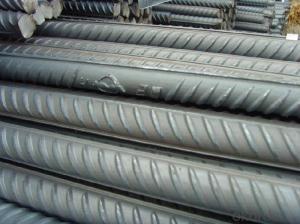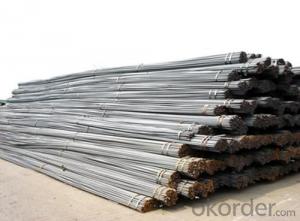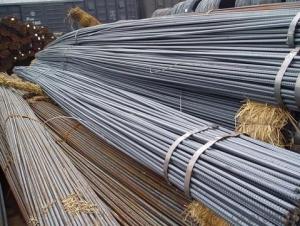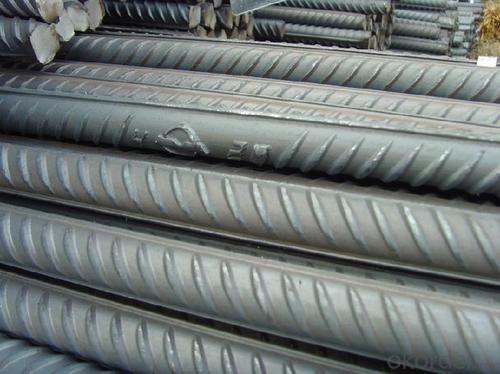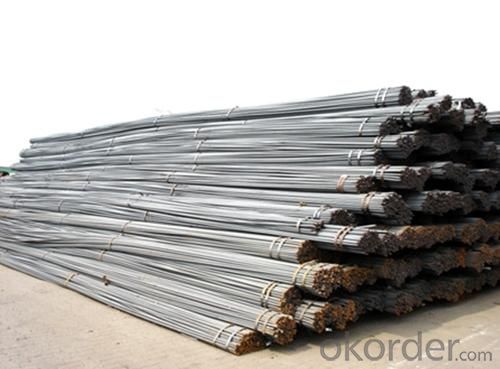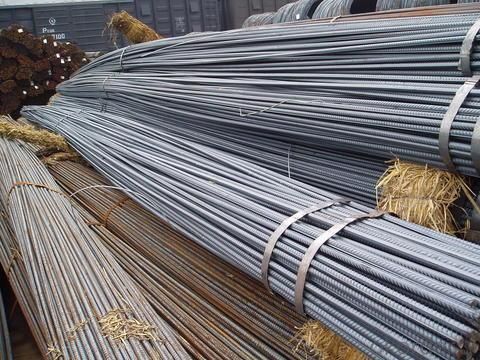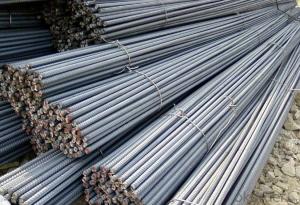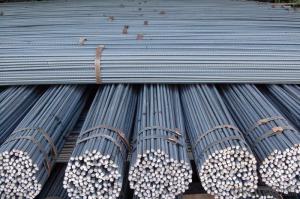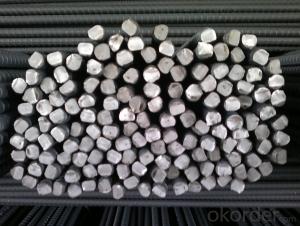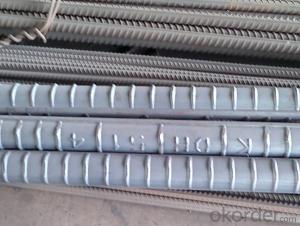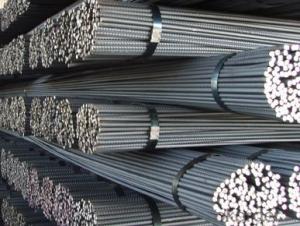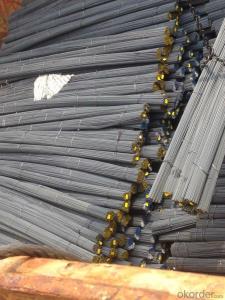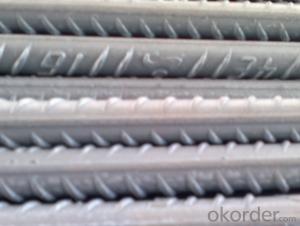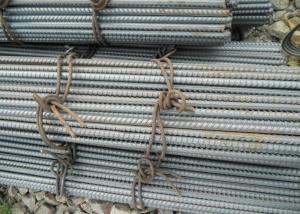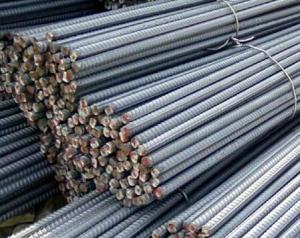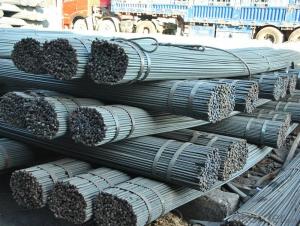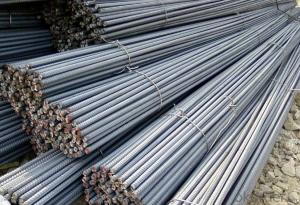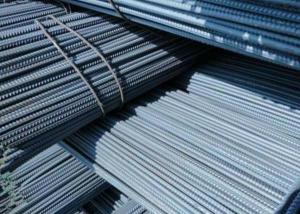Deformed Steel Bars All Size Steel Rebars Made In China
- Loading Port:
- Tianjin
- Payment Terms:
- TT or LC
- Min Order Qty:
- 25 m.t.
- Supply Capability:
- 24000 m.t./month
OKorder Service Pledge
OKorder Financial Service
You Might Also Like
Product Description:
OKorder is offering Deformed Steel Bars All Size Steel Rebars Made In China at great prices with worldwide shipping. Our supplier is a world-class manufacturer of steel, with our products utilized the world over. OKorder annually supplies products to European, North American and Asian markets. We provide quotations within 24 hours of receiving an inquiry and guarantee competitive prices.
Product Applications:
Deformed Steel Bars All Size Steel Rebars Made In China are ideal for structural applications and are widely used in the construction of buildings and bridges, and the manufacturing, petrochemical, and transportation industries.
Product Advantages:
OKorder's Deformed Steel Bars All Size Steel Rebars Made In China are durable, strong, and resist corrosion.
Main Product Features:
· Premium quality
· Prompt delivery & seaworthy packing (30 days after receiving deposit)
· Corrosion resistance
· Can be recycled and reused
· Mill test certification
· Professional Service
· Competitive pricing
Product Specifications:
1.commodity:deformed steel bars
2.grade:ASTM A615 HRB335 HRB400 HRB500 BS4449 grade460
3.size:6#-32#
4.length:6m 9m 12m
Chemistry % | |||||||||||||
Designation | Chief component | Impurities maxmium | |||||||||||
Ta | Nb | Fe | Si | Ni | W | Mo | Ti | Nb | O | C | H | N | |
Ta1 | Remainder | 0.004 | 0.003 | 0.002 | 0.004 | 0.004 | 0.002 | 0.03 | 0.015 | 0.004 | 0.0015 | 0.002 | |
Ta2 | Remainder | 0.01 | 0.01 | 0.005 | 0.02 | 0.02 | 0.005 | 0.08 | 0.02 | 0.01 | 0.0015 | 0.01 | |
Permissible variations in diameter for rods
Diameter, inch (mm) | Tolerance, +/-inch (mm) |
0.125~0.187 excl (3.175~4.750) | 0.003 (0.076) |
0.187~0.375 excl (4.750~9.525) | 0.004 (0.102) |
0.375~0.500 excl (9.525~12.70) | 0.005 (0.127) |
0.500~0.625 excl (12.70~15.88) | 0.007 (0.178) |
0.625~0.750 excl (15.88~19.05) | 0.008 (0.203) |
0.750~1.000 excl (19.05~25.40) | 0.010 (0.254) |
1.000~1.500 excl (25.40~38.10) | 0.015 (0.381) |
1.500~2.000 excl (38.10~50.80) | 0.020 (0.508) |
2.000~2.500 excl (50.80~63.50) | 0.030 (0.762) |
FAQ:
Q1: Why buy Materials & Equipment from OKorder.com?
A1: All products offered byOKorder.com are carefully selected from China's most reliable manufacturing enterprises. Through its ISO certifications, OKorder.com adheres to the highest standards and a commitment to supply chain safety and customer satisfaction.
Q2: How do we guarantee the quality of our products?
A2: We have established an advanced quality management system which conducts strict quality tests at every step, from raw materials to the final product. At the same time, we provide extensive follow-up service assurances as required.
Q3: How soon can we receive the product after purchase?
A3: Within three days of placing an order, we will begin production. The specific shipping date is dependent upon international and government factors, but is typically 7 to 10 workdays.
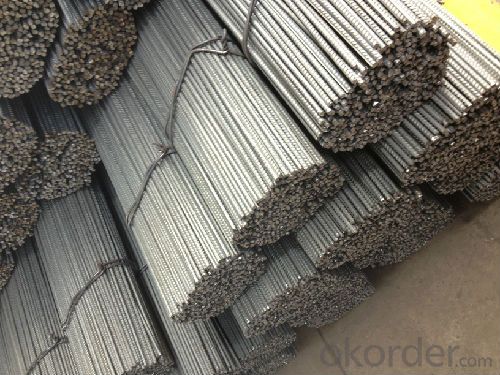
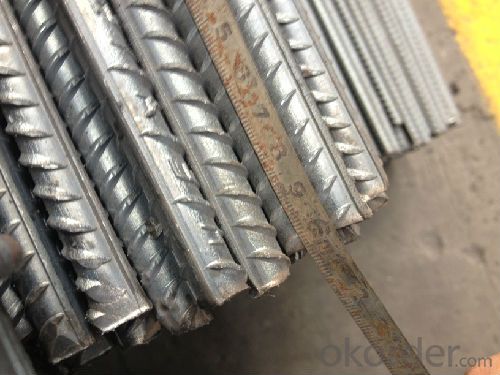
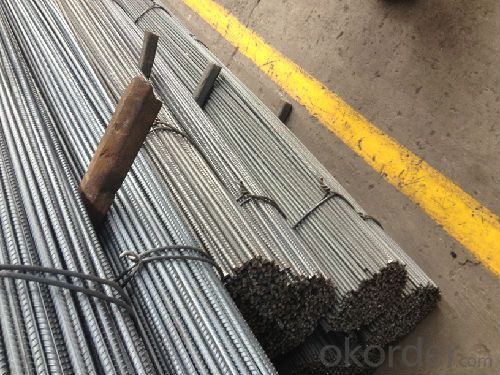
- Q: What is the effect of chloride ions on steel rebars?
- The presence of chloride ions in the environment can have a detrimental effect on steel rebars. Chloride ions can penetrate the protective oxide layer on the surface of the steel and react with the iron atoms, leading to the formation of iron chloride compounds. These compounds are highly corrosive and can cause the rebars to rust and eventually weaken. This corrosion process, known as chloride-induced corrosion, can significantly reduce the structural integrity and lifespan of steel rebars, posing a risk to the overall stability of reinforced concrete structures. Therefore, it is crucial to protect steel rebars from chloride exposure through proper design, construction, and maintenance practices to ensure their long-term durability and safety.
- Q: What is the content ratio of the screw steel and manganese steel?
- Steel: content index mainly includes: C, Mn, P, S, Si, different grades, different content, its range is C (0.10 ~ 0.40%), Mn < 1.80%, P < 0.050%, S < 0.050%, Si (0.60 ~ 1%).
- Q: Can steel rebars be used in corrosive environments?
- No, steel rebars are not suitable for use in corrosive environments as they are prone to corrosion and can weaken over time.
- Q: Can steel rebars be used in high-rise buildings?
- Yes, steel rebars can be used in high-rise buildings. Steel rebars are commonly used as reinforcement in concrete structures, including high-rise buildings, to increase their strength and durability. The use of steel rebars helps to distribute the load and enhance the structural integrity of the building, making them a suitable choice for high-rise construction.
- Q: Why does the steel thread have longitudinal ribs?
- The main function of the longitudinal ribs is the force to improve the performance of the transverse ribs, the stress of support surface transverse rib in the longitudinal direction, reducing flange stress concentration, so as to improve the mechanical strength of the reinforced rib, deformation of bond between concrete and steel reinforced concrete, the collaborative work and better.The effect of the longitudinal ribs is indirect, which improves the mechanical properties of the transverse ribs and indirectly enhances the bond with the concrete.
- Q: What are the guidelines for ensuring proper concrete cover over steel rebars?
- Proper concrete cover over steel rebars is crucial for the long-term durability and performance of reinforced concrete structures. Here are some guidelines to ensure the correct concrete cover over steel rebars: 1. Follow building codes and specifications: Building codes and specifications provide minimum requirements for concrete cover over steel rebars. These guidelines are established to ensure structural integrity, fire resistance, and resistance to corrosion. It is essential to consult and adhere to the applicable building codes and specifications for the specific project. 2. Determine the required concrete cover: The required concrete cover depends on various factors, such as environmental conditions, exposure to aggressive agents, structural design, and reinforcement type. Structural engineers typically determine the required concrete cover based on these factors to ensure the rebars are adequately protected. 3. Use appropriate concrete mix design: The concrete mix design should be carefully selected to achieve the desired strength, durability, and workability. The mix design should consider factors like the quality and size of aggregates, cement content, water-to-cement ratio, and use of additives or admixtures. Using a well-designed concrete mix will help ensure proper bonding and adequate protection of the steel rebars. 4. Maintain proper construction practices: During construction, it is crucial to maintain proper practices to ensure the correct concrete cover over steel rebars. This includes using proper formwork and reinforcement placement techniques, ensuring proper concrete placement, compaction, and curing. The rebars should be adequately positioned and securely tied to maintain the required cover and prevent displacement during concrete pouring. 5. Inspect and monitor during construction: Regular inspections and monitoring at various stages of construction are essential to ensure compliance with the required concrete cover. This includes checking reinforcement placement, cover thickness, and overall quality of the concrete. Any deviations from the specified requirements should be addressed and rectified promptly. 6. Protect against corrosion: Adequate concrete cover over steel rebars plays a significant role in protecting against corrosion. However, additional measures such as using corrosion-resistant rebars, applying epoxy coatings, or using corrosion inhibitors can further enhance the durability and longevity of the reinforced concrete structure. 7. Document and maintain records: It is important to document the construction process, including the reinforcement placement, concrete cover thickness, and any deviations or modifications made during construction. This documentation will serve as a valuable resource for future reference, maintenance, and repairs. By following these guidelines, proper concrete cover over steel rebars can be ensured, resulting in durable and structurally sound reinforced concrete structures. It is always recommended to consult with structural engineers and construction professionals for specific project requirements and to ensure compliance with local building codes and regulations.
- Q: How do steel rebars contribute to the overall strength of a structure?
- Steel rebars contribute to the overall strength of a structure by providing reinforcement against tension and compression forces. They are embedded in concrete to enhance its structural integrity and increase its resistance to cracking or collapsing under heavy loads. The rebars help distribute the applied stress more evenly throughout the structure, improving its resistance to bending or shearing. Ultimately, steel rebars significantly enhance the strength, durability, and stability of a structure, making it capable of withstanding various external forces and ensuring its long-term structural integrity.
- Q: Can steel rebars be used in structures with long spans?
- Yes, steel rebars can be used in structures with long spans. Steel rebars are commonly used as reinforcement in concrete structures, including those with long spans such as bridges, high-rise buildings, and stadiums. The high tensile strength and durability of steel rebars make them suitable for withstanding the forces and stresses that occur in such structures.
- Q: What are the guidelines for repairing or replacing corroded steel rebars in existing structures?
- The guidelines for repairing or replacing corroded steel rebars in existing structures vary depending on the severity of the corrosion and the specific requirements of the project. However, there are some general guidelines that can be followed: 1. Assessment: Before proceeding with any repairs or replacements, a thorough assessment of the corrosion damage should be conducted. This may involve visual inspections, non-destructive testing, or even laboratory analysis of samples taken from the rebars. 2. Safety: Safety should always be the top priority when working with corroded rebars. Adequate precautions should be taken to ensure the safety of workers and surrounding areas. This may include the use of personal protective equipment and ensuring a stable work environment. 3. Determine the extent of corrosion: It is important to determine the extent of corrosion and whether it has affected the structural integrity of the rebars. This can help in deciding whether repair or replacement is necessary. 4. Repair methods: Depending on the severity of corrosion, various repair methods can be employed. These may include removing the corroded portion of the rebar and applying a corrosion inhibitor or protective coating, or using electrochemical techniques such as cathodic protection to prevent further corrosion. 5. Replacement: If the corrosion damage is extensive and repair is not feasible, the corroded rebars may need to be replaced. The replacement rebars should be of the same or higher grade and should be properly anchored to maintain the structural integrity of the existing structure. 6. Design considerations: When repairing or replacing corroded rebars, it is important to consider the design requirements of the structure. The repaired or replaced rebars should meet the necessary load-bearing capacity and should be properly integrated into the existing structure. 7. Quality control: Throughout the repair or replacement process, rigorous quality control measures should be implemented to ensure the effectiveness and durability of the repairs. This may include regular inspections, testing, and monitoring of the repaired or replaced rebars. It is important to note that these guidelines are general recommendations and should be tailored to the specific circumstances and requirements of each project. Therefore, it is advisable to consult with a structural engineer or a professional experienced in repairing corroded steel rebars for a more accurate and detailed guideline.
- Q: Can steel rebars be used in structures with aggressive chemical exposure?
- When working with structures that are exposed to aggressive chemicals, it is crucial to take precautions to prevent the corrosion of steel rebars. Over time, the corrosion weakens the structure. To minimize this risk, it is possible to apply corrosion-resistant coatings or materials to the rebars. These coatings create a barrier between the rebars and the aggressive chemicals, reducing the likelihood of corrosion by preventing direct contact. Moreover, it is necessary to regularly inspect and properly maintain the rebars to detect any signs of corrosion and take appropriate action. By implementing these protective measures, steel rebars can be safely utilized in structures exposed to aggressive chemicals.
Send your message to us
Deformed Steel Bars All Size Steel Rebars Made In China
- Loading Port:
- Tianjin
- Payment Terms:
- TT or LC
- Min Order Qty:
- 25 m.t.
- Supply Capability:
- 24000 m.t./month
OKorder Service Pledge
OKorder Financial Service
Similar products
Hot products
Hot Searches
Related keywords
